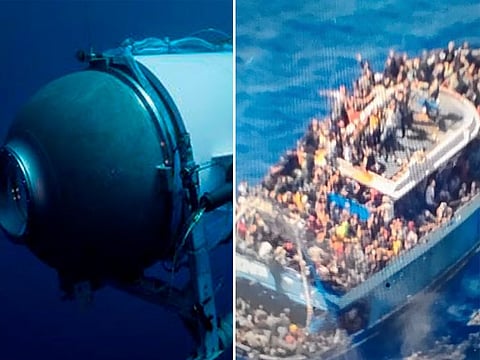Tragedies at sea and two sides to a media coverage
Adrenalin comes from drama and status, the media shows because we watch, and it is a loop

The tragedy of the submersible Titan captured popular imagination in recent weeks and posed several questions regarding the CEO who apparently had cut safety corners. There was scepticism that multiple waivers had been signed by those who perished.
Privilege is a dual edged sword; it comes with its own burden. In a globally polarised world, the line between the haves and the have-nots is not new, but as with everything that is brushed by social media it showed up the worst of humanity.
Wealth is not an even spread and if you are in India, it is also laced with dichotomy. As the rich businesses at the top get richer, they are feted and embraced.
A couple of notches down and the ‘elite’ must pay for their sins of affluence, it is this sentiment of schadenfreude- pleasure or joy derived by someone from another person’s misfortune and pain- that extended to those who perished on board the Titan. We must question ourselves when the satisfaction of seeing people brought down doesn’t even stop at death.
Yet, it’s not like we prefer the poor or the underprivileged more. The breathless coverage of the Titan with 5 people on board made international headlines for days. We were fed on who they are, why they were there and different scenarios of what could possibly have gone wrong. And let’s be honest, every drop of information that was being shared was lapped up.
Shoddy rescue operations
Barely days earlier a fishing boat packed with 750 refugees- mainly of Pakistan and Afghan origin- on its way from Libya to Italy sank off the coast of Greece. Those on board had risked their lives for a better future and failed.
The responsibility to protect them lies elsewhere even as their ordeal was shrugged off, they were the nameless, forgotten people. This was a humanitarian tragedy, 500 of them are missing, presumed dead and among them are many children.
The Greek coast guard has been accused of shoddy rescue operations and survivors from the fishing trawler speak of how they pushed bodies floating around them to swim for survival. The comparisons between the resources and the lack of them in the twin tragedies is justifiable.
Global rescue teams were mobilised, and millions of dollars were spent in search of the missing submersible, a sunken boat though didn’t get a fraction of that attention. Identity is a loaded word; it could also be the difference between a chance at life or being abandoned.
It is why a plane crash gets more attention than a bus accident with passengers from the interiors of a country or a celebrity speaking during a movie promotion gets more airtime than a faceless girl gang-raped.
It is also why thousands of homes burnt in the state of Manipur are not getting attention, but a former cricket captain makes headlines for playing candy crush. Once we outraged for the gang rape of Nirbhaya, now desensitised we mock at death or stay silent.
The adrenalin comes from drama and status, the media shows because we watch, and it is a loop. Asylum seekers travelling into the unknown has no glamour, nor is it something we have not seen before. Their misfortune no longer moves us.
Instead, a vessel hurtling into the dark depths knowingly was fascinating, sensationalism sells copies and even those who ridicule the kingdom of wealth stayed glued to the Titan story as it was covered from every exhaustible angle. Suleman’s aunt was interviewed, his mother has also been on television. What do we know about the families of those who drowned off the coast of Greece?
Equitable media coverage is a myth but if there is one thing that comes out from the dual tragedies it is the hope that it made us uncomfortable. 100 children are at the bottom of the sea, while Suleman the teenager who went along with his father deserves all our prayers, why don’t they?




